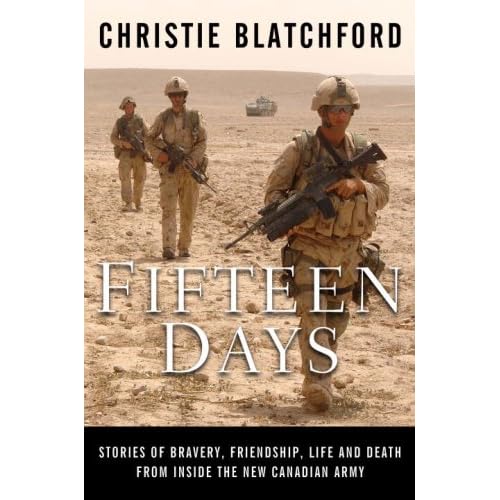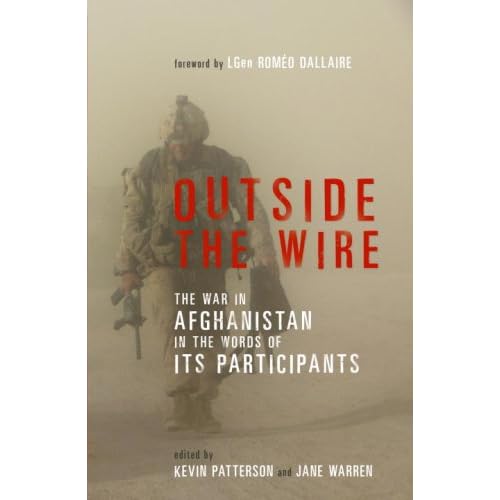
Fifteen Days: Stories of Bravery, Friendship, Life and Death From Inside the New Canadian Army. Christie Blatchford. Toronto: Doubleday Canada, 2007.

Outside the Wire: The War in Afghanistan In the Words of Its Participants. Ed. Kevin Patterson and Jane Warren. Toronto: Random House Canada, 2007.
It may be years from now before the definitive history (if indeed there is such a thing) of Canada’s war in Afghanistan is written. These two books go a long way towards filling the gap while we wait to see how the war will be decided and what it all meant.
Christie Blatchford’s book is about the war from the point of view of soldiers at war and their families at home. Well known as a gruff Toronto street and courtroom reporter, Blatchford was embedded with Task Force Orion, a battle group built around the Princess Patricia’s Canadian Light Infantry that served in theater 2006 and early 2007. I doubt she would object to being called an apologist for the Canadian army. In fact, her book begins with a quotation from Rudyard Kipling’s poem “Tommy”: “Yes, makin’ mock o’ uniforms that guard you while you sleep is cheaper than them uniforms, an’ they’re starvation cheap”.
The uniforms may not be that cheap anymore, and Canadian troops are infinitely better paid than they were in Kipling’s time, but Blatchford is unashamedly adoring of the men and women who wear those unforms. She has a clear-eyed view of them, of their language, their fondness for beer and cigarettes, their goofy humour. Reading her, another line from “Tommy” comes to mind, about how men in barracks don’t turn into plaster saints, but in Blatchford’s view they are saints of a sort. One line really sums up her view of them: “I love watching them returning from the field, the troops filthy and exhausted but always indomitable” (p. 236).
No one could say that Blatchford doesn’t know her subjects. She’s ridden with our soldiers, ate with them, tried to catch in the shelter of LAVs (Light Armoured Vehicles) and awoken itchy with sand fleas, and has been under fire with them. Her description of having to defecate in the middle of a firefight may be the grittiest account of combat that one could want. The strength of her writing is its personal quality, her willingness to allow her subjects to speak in their own words, and her obvious love of them. That love comes through strongly when she speaks with a logistics officer, John Conrad, who lost soldiers doing the Cinderella job of convoy resupply: “We’re spending human capital there, the very best this country has to offer, and thre’s no harm in pausing for reflection and grief when this is being spent. The cause is just. The Afghan people are deserving, but more important, the Canadian people are deserving of national security, and the cause is, I believe, just. But as we’re spending these diamonds, it’s okay to be human. In fact, it’s f***ing necessary” (p. 235).
Outside the Wire (the term means being outside the relative safety of a camp or forward operating base) is a more nuanced book, because the voices are more diverse. Patterson and Warren are both Canadian writers, and Patterson is a former Army doctor who describes his own tour in the military hospital at Kandahar (KAF) with a perceptive and lightly cynical touch. If anyone were to update M*A*S*H* for the ipod generation, Patterson would be the go to guy. Several of the voices here are of the dead. Captain Nichola Goddard, lovingly evoked in Blatchford’s book, speaks in emails home that are full of idealism and a modest bravery. Mike Frastacky, a civilian freelance aid worker and carpenter, describes in a charmingly offbeat manner how dangerous and real it is to live outside of the NATO bubble of protection, among Afghan villagers. Frastacky was shot to death by the Taliban while helping build a school northeast of Kabul. His death offers much food for thought as to why the West should be in Afghanistan.
Among the soldiers, my friend Martin Anderson from 4 Battalion, The Royal Canadian Regiment, is one of several army reservists included. He describes his CIMIC (Civil Military Co-operation) work in Kabul early in the mission, before the security situation eroded so badly, and paints a picture of the human need we are trying to address. Ian Hope, TF Orion’s commander, describes an episode that deserves to become immortal in Canadian Army history, being sent to retake the villages of Nawa and Garmser in Hellmand province, but not having any maps to find them (they found and retook them). Hope’s description of working with US troops includes a comment – “I realized that, at some point in the past decade, we have had a fundamental shift in the culture of the Canadian infantry, making us identify most readily with American, not British, soldiers” (p. 154) – that sums up the theme of History of the Canadian Military. Another infantry officer, Casey Baldwin (2 PPCLI) sums up the estrangement soldiers feel when they come home to Canada, and offers some haunting war poetry.
Both these books offer real and honest accounts of what it is like for the Canadian soldiers and civilians in Afghanistan and at home. They are long on experience and short on geo-politics, but as voters and citizens who may be called to elect a government based on the future of the Afghan mission (whatever that may be after 2009), these are important books and worthy of our time. Perhaps Patterson and Warren say it best at the end of their introduction: “The right thing has to be done in Afghanistan. Whatever that is” (p. 5).


No comments:
Post a Comment